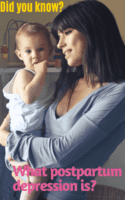Sarah was so excited to see her little newborn cousin. She rushed through the door to her aunt’s room but stopped dead in her tracks when she saw her aunt crying hysterically. Later that evening Sarah’s mom explained to her that her aunt was suffering from postpartum depression. Sarah was confused and didn’t understand what her mom was saying, so she did what any 13-year-old teen would do – she used the internet to learn more.
What is postpartum depression (PPD)?
Even though the birth of a baby comes with excitement and joy, it can also come with something unexpected – depression. This is called postpartum depression (PPD).
New mothers can experience mood swings, anxiety, crying and difficulty sleeping; this is all part of the process of bringing a life into this world and sometimes it can be overwhelming. However it is normal to experience these feelings and it’s referred to as post-partum blues.
When things become more difficult and long-lasting, it is referred to as PPD.
According to the South African Depression and Anxiety Group (SADAG) about 10 to 15% of South African women suffer from PPD in the first year after giving birth.
Sarah had assumed that all moms are happy when they give birth but now she is aware that it is quite normal to feel overwhelmed and a little irritable.
She also found that there are three different types of depression.
Postpartum blues
This is the irritable phase of postpartum, lots of crying and it lasts for several days. No treatment is needed as it goes away on its own. Rest and support is usually needed during this period.
Postpartum depression
PPD can be distinguished by the lack of sleep, irritability, laziness, lack of appetite, anxiety and highly impaired concentration and decision-making. Experts say that if this period lasts longer than two weeks then help should be sought.
Postpartum psychosis
This is the end of the spectrum. Symptoms include mental confusion, increased activity, hallucinations, and even threats to harm the infant. It affects about one in a thousand women. This requires immediate attention and in most cases hospitalisation.
PPD can affect any woman or girl. Sarah found out that young teenage girls can also experience PPD. They may feel that they can never do what they once did, they may feel sad and incapable of taking care of a baby or just overwhelmed.
Causes
There isn’t a single cause for PPD, however physical and emotional issues influence it.
The physical changes include a drop in hormones, such as oestrogen and other hormones produced by the thyroid gland. This drop in hormones can leave you feeling tired, sluggish and depressed.
The emotional issues can be derived from being too anxious about the ability to care for your newborn. You may feel less attractive, struggle with a loss of identity or feel like you’ve lost control over your life.
Treatment
• The best way to treat PPD is through counselling, which may include the spouse and sometimes the interaction between the mom and the infant.
• Women can also decide to take antidepressants. Their doctor would advise on the possible benefits and risks.
• Hormone therapy may help with drop in oestrogen, which may ease the symptoms of PPD.
PPD in new fathers
A surprising new fact that Sarah discovered was that new fathers can also experience postpartum depression, sometimes called paternal postpartum depression. They too, experience the same symptoms that mothers experience. They may feel tired, overwhelmed, anxious or experience changes in their sleeping and eating patterns.
Sarah knew that if her aunt didn’t get help, her little cousin would suffer. She came up with a list of contact details to help her aunt.
Who to contact
South African Depression and Anxiety Group (SADAG) – 0828820072
Post Natal Depression Support Association (PNDSA) – 083 309 3911/ (021) 797 4411
Care Assist (health & psychiatric concerns helpline) – 011 359 5000
Sarah decided to write a note to her aunt and to all mothers. It spoke of how brave she thought her aunt and all moms are and how they’re still good mothers despite what they’re going through. She ended off with a quote by David Mitchell: “You say you’re ‘depressed’ — all I see is resilience. You are allowed to feel messed up and inside out. It doesn’t mean you’re defective — it just means you’re human.”
Read about how to deal with depression here
Tell us: How would you respond to someone suffering with postpartum depression?

